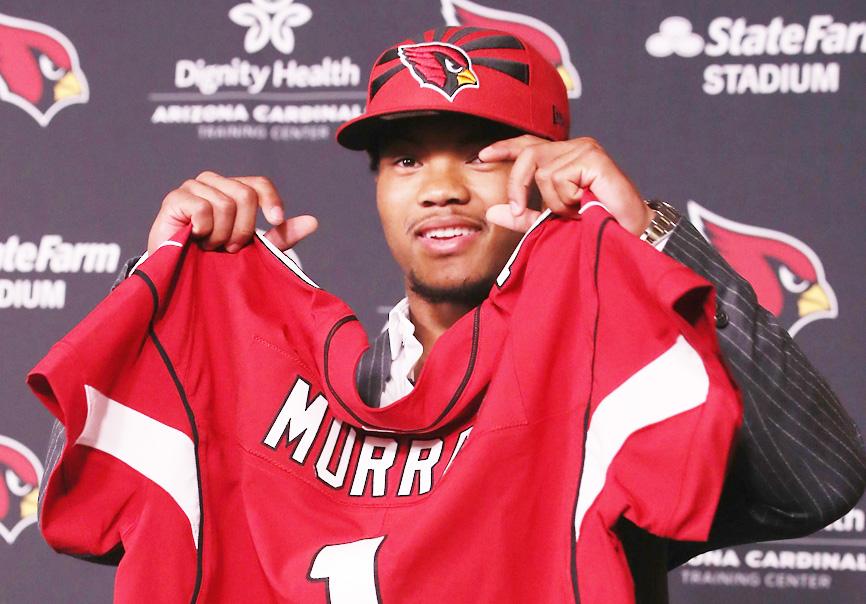An NFL draft handled remotely because of the coronavirus pandemic is the latest twist to an event that has become as popular as any professional football happening, short of the NFL Super Bowl.
On Thursday, NFL commissioner Roger Goodell alerted NFL teams in a memo that the dates of this year’s draft are to remain April 23 to 25, and the eight owners who comprise the NFL Management Council Executive Committee unanimously endorsed moving forward as planned.
So next month’s draft, originally set for Las Vegas, is to have a pretty much spartan look.

Photo: AFP
“All clubs should now be doing the necessary planning to conduct draft operations in a location outside of your facility, with a limited number of people present,” Goodell told the teams.
The draft is to be televised and, given the scarcity of sports offerings, the ratings for this “selection meeting” could be impressive — as is the history of the draft.
It began because Bert Bell had been burned and sought a way to get even. His creation, the NFL draft, has become an industry unto itself.
Bell owned the Philadelphia Eagles in 1933 and was hot to sign Stanley “King Kong” Kostka of the Minnesota Gophers.
All collegians were free agents back then — college football was far more popular than the pros — and Bell saw the bruising fullback/linebacker as a building block for his team, but Kostka signed with the Brooklyn Dodgers — yes, that was a football franchise back then.
Never mind that Kostka only lasted one season in the NFL, Bell had a calling.
“I made up my mind that this league would never survive unless we had some system whereby each team had an even chance to bid for talent against each other,” he later told reporters.
With some negotiating and arm-twisting — Bell was so good at that he soon would become NFL commissioner — he persuaded the club owners to try a draft.
The team with the league’s worst record would pick first and the rest would go in reverse order of their success in the standings.
On Feb. 8 and 9, 1936, in a Philadelphia hotel owned by the Bell family, the draft was born, with the Eagles (2-9) having the first selection.
The grab bag for talent was not a big deal — whether staged in Philadelphia, New York, Washington, Pittsburgh, Milwaukee, Los Angeles or Chicago — but then television stepped up.
In 1980, a new TV entity called ESPN offered to broadcast the proceedings.
Desperate for programming, ESPN hired Bill Fitts, who had worked games on CBS and NBC, as producer.
“I would say at the beginning it was like with our golf coverage,” Fitts said. “Look what it went to.”
The extravaganza elements are not to be present next month, but it is not an exaggeration to say that the draft has exploded beyond the selection meeting tag the league hung on it.
In 2018, a stadium was the site for the first time. After the AT&T Stadium, the draft headed to Music City, alongside the honky tonks on Broadway in Nashville, Tennessee — which was by far the biggest smash hit in its history.
Even in these times when it has wisely been scaled back, the NFL draft is a major event.

Barcelona star Lamine Yamal would be motivated by criticism ahead of the Clasico, Barcelona assistant coach Marcus Sorg said yesterday. Teenage winger Yamal has been in the spotlight in the Spanish capital after joking that Real Madrid “steal” and “complain” during an appearance on a social media stream. Champions Barca face Real Madrid today in La Liga at the Santiago Bernabeu, looking for a fifth consecutive win over their rivals. “Lamine is a top player and I think [the criticism] will be motivating for him,” Sorg told a news conference. “I hope we all see him tomorrow [give] the best performance.” The 18-year-old Spain

‘A HISTORIC moment’: ‘I think we all need to take a step back and appreciate Leo Messi is playing in Major League Soccer,’ league commissioner Don Garber said Lionel Messi raised the Golden Boot. He then got Inter Miami started with his head. The Argentine opened the scoring with a diving header in the first half, then capped the scoring in the 96th minute as Inter Miami opened the MLS playoffs with a 3-1 win over Nashville SC in Game 1 of their Eastern Conference best-of-three first-round series on Friday night. Messi and Ian Fray had the assists on Tadeo Allende’s second-half tally for Inter Miami, who now get two chances to advance out of the first round for the first time in Messi’s two-and-a-half-year tenure with the team. Game

‘COMPLETE GAME’: ‘To be honest, I’m not sure about the history, but I’m very happy about what I did today,’ Yamamoto said through a translator after the game Yoshinobu Yamamoto pitched a World Series game from another era. Sandy Koufax had October outings like this, and so did Orel Hershiser, but those types of performances have vanished in modern baseball. Until this 178cm starter from Japan delivered like the aces of old. Yamamoto threw a four-hitter for his second consecutive complete game, the first in the World Series since 2015, and the defending champion Los Angeles Dodgers beat the Toronto Blue Jays 5-1 on Saturday night to tie their best-of-seven matchup at one game apiece. “It’s kind of the throwback,” Dodgers manager Dave Roberts said. “When he starts a game, he

Japan’s narrow defeat by Australia showed they can compete with the best teams in the world, coach Eddie Jones said after his side fell to a 19-15 loss yesterday. Australia coach Joe Schmidt led the Wallabies for the first time against Eddie Jones, his predecessor and now Japan coach. During Jones’ second tenure as Australia coach, the Wallabies lost seven of nine tests and were eliminated in group play at the 2023 World Cup. “What I’m super pleased about is that now we [Japan] are a team that stays in the fight,” Jones told reporters. “We kept going, we could have won